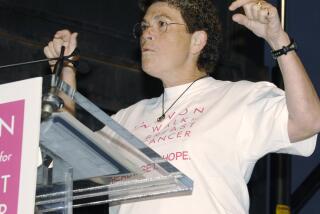She won a war for hospitals
- Share via
Tidy hair tucked into a white cap, face illuminated by the lantern that led her way, Florence Nightingale achieved lasting fame by saving the lives of British soldiers in wartime. But although she revolutionized hospital care during her 90 years of life, she actually saw few patients aside from those battle-wounded Brits. In fact, she’s still largely remembered for what she did in the short span of 18 months in her early 30s.
---
In late 1854, the 34-year-old Nightingale left her post as superintendent of London’s Institution for the Care of Sick Gentlewomen in Distressed Circumstances and traveled to Turkey, the site of the Crimean War.
There, she encountered a horror. British, French and Turkish troops were battling Russian forces, and within weeks of her arrival the British army “hospital” -- a converted, rat-infested Turkish barracks in the town of Scutari -- had 2,300 patients and no supplies.
The scene was staggering: Wounded soldiers infested with lice lay bleeding on the barracks’ filthy, rotted wood floors. There were no towels or soap for cleaning patients, no mops for cleaning floors, no washbasins or chamber pots and not enough bandages to go around. Those who weren’t dying of their war wounds were succumbing to dysentery, malnutrition, starvation, infections and frostbite.
It soon became clear that more troops -- up to 70 a day -- were dying in the hospital of disease than of wounds sustained in battle.
Nightingale set her team of nurses to work, cleaning the barracks, tending to patients, opening windows for ventilation and lighting stoves for warmth. She teamed up with a British journalist to publicize the plight of the soldiers back home. Funds came pouring in.
Nightingale kept a running count of preventable deaths in the hospital and began systematic record-keeping and data analysis in the wards. She pulled her observations together in a lengthy, detailed report, and sent it off to Britain, demanding more supplies.
In less than a year under her watch, death rates in the hospital were cut in half. Ultimately, the British army put Nightingale in charge of all of its wards in the Crimea.
Back in England after the war, Nightingale eschewed celebrations held in her honor, staying at home instead. After a collapse at age 37, she remained bedridden for the rest of her days.
But she didn’t rest: Over the years she founded a nursing school, wrote books on nursing and hospitals; advised the British government on how to improve the health of the army; and gave the U.S. Army pointers on setting up military hospitals during the Civil War. Though she never set foot in India, she wrote lengthy reports on the state of health there.
Although Nightingale is mostly remembered for her early days of nursing, at one time she gained renown for her statistical acumen too. She was the first woman elected to Britain’s Royal Statistical Society. She once said, “To understand God’s thoughts, we must study statistics.”
She’d probably approve of the widespread use of statistics in health and medicine to this day -- although some figures would surely disappoint: namely the growing shortage of nurses, both in Britain and the U.S.
Elena Conis
More to Read
Sign up for Essential California
The most important California stories and recommendations in your inbox every morning.
You may occasionally receive promotional content from the Los Angeles Times.













